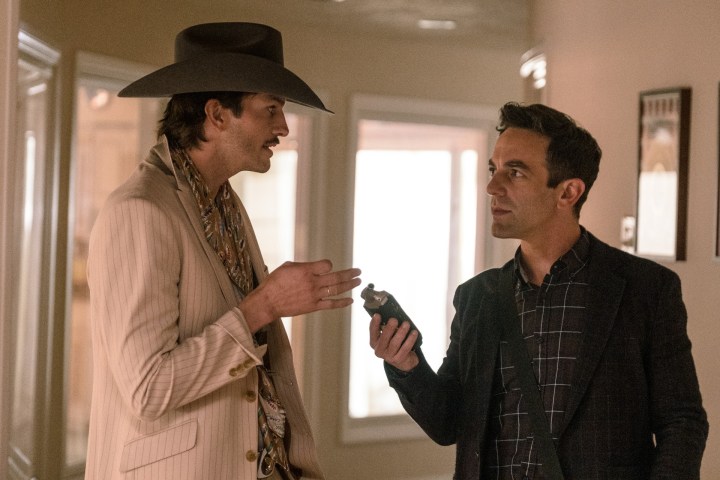When we meet podcaster/reporter Ben Manalowitz, the lead character in B.J. Novak’s directorial debut Vengeance, he’s engaging in the kind of behavior that seems typical of a single New York male asshole. At a bougie publishing party in Brooklyn, he’s busy rating and ranking random women in his DMs with his equally cringy friend John, played all too well by the singer John Mayer. Unlikable protagonists are all the rage these days, and after just five minutes, Ben not only qualifies as one but also threatens to become too sleazy and insufferable for the movie’s own good.
Yet the beauty of Vengeance, which Novak also stars in (as Ben) and wrote, is that nothing is what it seems, and for a murder mystery that doubles as a culture clash comedy, that’s an extremely good thing. Alternatively funny and moving, the movie is always intelligent and sensitive to the characters it could have just mocked. It’s the rare mystery that prioritizes the life of the victim, and rarer still, it’s one of the few summer films with something to say.
Dead White Girl

The mystery begins when Ben is called by the brother of one of his past hookups, Abilene Shaw, informing him that she’s been found dead of a drug overdose in an empty field. Sensing a story opportunity (the podcast is eventually called Dead White Girl, which is both on-the-nose and bluntly accurate to the exfoliative nature of true crime media), Ben agrees to attend her funeral in Texas, unsure as to why he’s been so fondly remembered by someone he himself can barely recall. Once there, he meets Abilene’s family: brother Ty ( Boyd Holbrook, excellent), a handsome urban cowboy; mother Sharon (J-Smith Cameron); sisters Paris (Isabella Amara) and Kansas City (Dove Cameron), both eager to be famous; grandma Carole (Louanne Stephens), who likes to solve problems with a shotgun; and little brother El Stupido (Eli Abrams Bickel), who does not live up to his nickname.
On paper and when you first meet them, these people are Texas caricatures who are instantly looked down upon by Ben, who can’t relate to them at all. But as Ben’s editor Eloise (Insecure‘s Issa Rae, sharp as ever) insists on him staying in Abilene’s desolate town to get to the bottom of her murder, he begins to connect them and the other citizens as less like subjects of a podcast and more like people genuinely rocked by their shared tragedy.
It’s to Novak’s credit that he takes the time to give every character, even possible suspects like possible Mexican cartel member Sancholo (Zach Villa), nuance and life. For instance, Kansas City may want to become famous and leave her town for good, but she’ll take umbrage if Ben, or anyone else, insults it in front of her. Ty may be a good old cowboy who loves drinking beer, but he also is deeply committed to his family, and it’s this desire that fuels his need for vengeance and, eventually, Ben’s need to find her killer.

Most prominently is Abilene’s music producer Quinten Sellers (Ashton Kutcher, surprisingly good), himself an outsider who is first introduced rhapsodizing over another young girl’s singing voice. We’ve seen this character before, the sleazy mogul taking advantage of his naïve students, yet both Novak and Kutcher don’t push Quentin’s menace. You’re not entirely sure what his deal is or whether or not you can trust him, and that’s entirely the point.
Not just another mystery
Ben’s quest for answers in solving Abilene’s death leads him to experience the small town life that many Texas natives can relate to and outsiders can chuckle at. In one scene, Ben attends a rodeo and incorrectly names the wrong university as his preferred school of choice in Texas. Only a city slicker would cite UT-Austin over Texas Tech, and Ben’s embarrassment is played for well-earned laughs. It’s good to see the arrogant New Yorker get taken down a peg.

In another scene, Ben accompanies the Shaw family to their gourmet eatery of choice: Whataburger. When he asks what makes the Texas-based chain so special from other fast food restaurants, each Shaw blankly asserts that “it’s there.” What more explanation does he need? It’s Whataburger! These scenes are comedic, and there’s a subtle clash of cultural humor that isn’t overdone or played too broadly.
Yet the heart of the movie is the mystery of Abilene’s death, and it’s here that Novak reveals his intentions to not only provide a good whodunit but also to critique the true crime genre itself. There’s a third act monologue by a character that explicitly states who Novak is condemning: us, or more specifically, the culture which encourages hot takes without context and division without empathy. Vengeance argues that the revelation of Abilene’s murderer, and the story of how she died, shouldn’t be consumed by us or anyone else beyond her family. We’re using her death as entertainment, something to pass the time and sell to advertisers.
In its final moments, Novak doesn’t let us off the hook or provide easy answers. We got what we wanted, but did we have any right to in the first place? Vengeance is many things: a compelling murder mystery, a funny City Slickers update, and a critique on true crime and podcast culture. That it succeeds at all three, while also leaving us entertained and challenged, is a small miracle in a summer full of easy delights and superficial pleasures.
Vengeance is out now in movie theaters nationwide.
Editors’ Recommendations
Credit: Source link


Comments are closed.